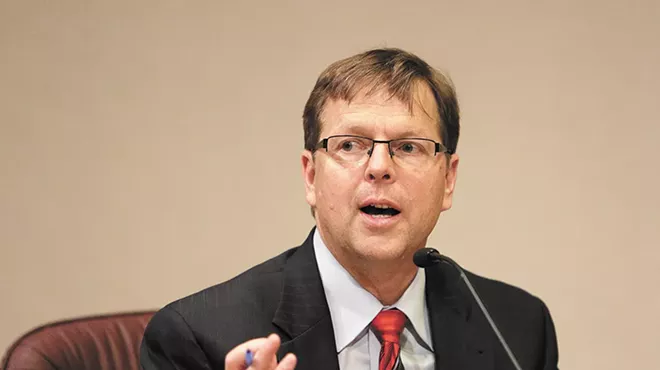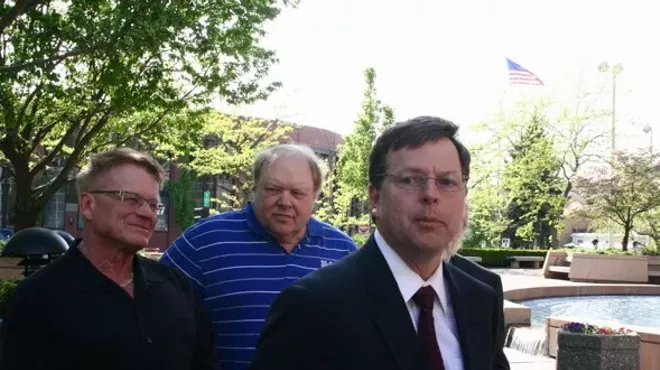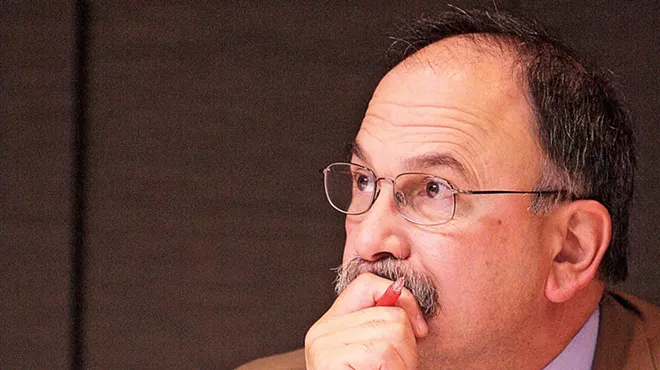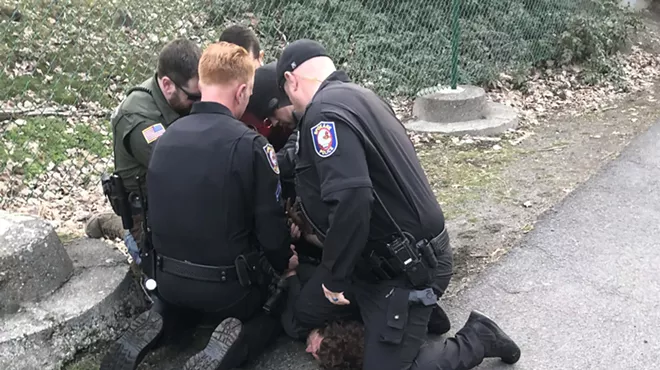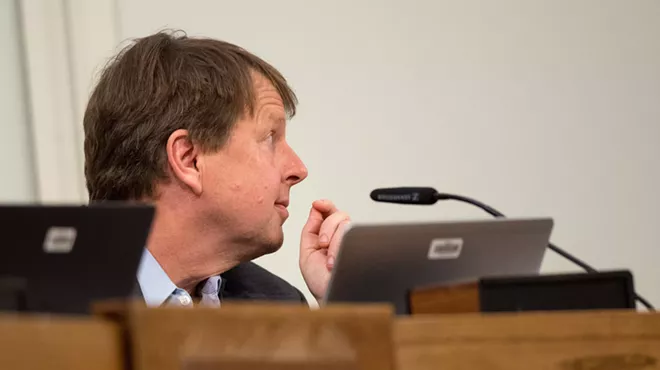click to enlarge
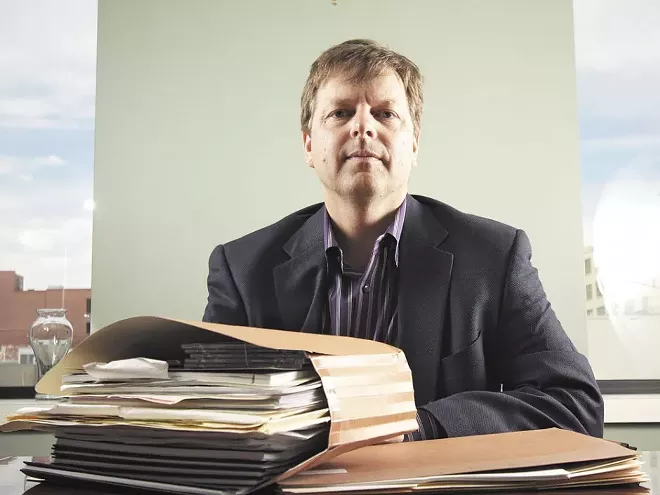
Young Kwak photo
City Council President Breean Beggs back in his Center for Justice days.
Right now, protests across the country are asking what it takes to hold bad cops accountable for their actions. Today, the Spokane City Council just so happens to be helmed by a rare person who actually
did manage to hold a police officer accountable.
In 2012, Breean Beggs successfully got a $1.67 million settlement and a city apology for the family of Otto Zehm, a mentally disabled Spokane janitor who died after being beaten, tased and hogtied by police.
Beggs was the "Chief Catalyst" for the local civil rights organization the Center for Justice. He ran for
Spokane County Prosecutor in 2014 on a progressive smart justice platform, only to get crushed by a tough-on-crime Republican. He was the attorney for the city of Spokane's Ombudsman Commission, the group that helps handle police oversight
In fact, a decade ago this summer, the hard-charging pro-police attorney with the city of Spokane had sent a cease-and-desist letter to Beggs, ordering him to stop
all communications with elected officials or be reported to the state bar association. It was an attempt, he said, to stop him from being involved with the city's police oversight efforts.
But today? Beggs is the City Council president. The future of police oversight reform is in his hands.
Last week, Beggs and other council members announced a resolution to pursue a
slew of potential police reforms including putting restraints on no-knock police raids, restrictions on unorthodox arrest tactics, and a mandate requiring police officers to intervene if they witness abuse from another officer.
The
Inlander spent about an hour chatting with Beggs about police reform last week. Here are a few selections from that conversation, edited for length and clarity.
INLANDER: During the Otto Zehm case, you were researching all these other cases where people in Spokane have died at the hands of law enforcement. What did you learn?
BEGGS: The pattern I saw was that everybody who died at the hands of law enforcement had a mental health issue. And the police treated it as if they had oppositional defiance disorder, and they simply need to be forcibly brought into check. And because of that, the police would just use more and more force and be willing to kill people in order to get people to follow their commands.
And the challenge was that the people they were interacting with had something going on with their brain that didn't allow them to understand the logic of the situation. And so rather than calming down and following directions, they got more agitated. And then the police would use more and more force until they killed someone.
So they were bringing the wrong tool to the job? How has the Police Department done since then with responding to mental health issues?
We've made significant progress on that issue. You might remember part of the civil settlement with the city was that every police officer had to go through 40 hours of crisis intervention training, which was all about learning about people with cognitive issues, and de-escalation practices. We now have co-deployed teams where we have social workers riding along with officers. We have community outreach programs. We've improved our use-of-force policy. So we've made great progress.
But the fundamental issue of "Can police simply use force when someone's not following their directions," that's still within their culture and training. I'll give you two examples.
The first one is the German shepherd that the police
threw into the pickup truck a year ago, when the person wasn't coming out as fast as they want. Even though their hands were visible, and they were saying they're coming out, they were like, "No, we're throwing the dog in there to start biting you." And that's just kind of that old school culture of, "if you don't follow my directions, you're gonna be in pain."
And then we saw it a little bit in the May 31st justice rallies in downtown Spokane, where the police wanted to disperse the crowd. So even though the vast majority of the crowd wasn't doing anything wrong and were literally kneeling with their hands up, saying "don't shoot," the police were firing tear gas, using rubber bullets, shooting at people because they weren't following directions.
They were giving a lawful order to disperse, and they had a reason for doing it. But that idea — that you're simply going to use force against people who aren't endangering other people — it's kind of a fundamental violation of our social contract. And it's also not very effective. It didn't work. All it did was it moved people another block away.
And then the police used more tear gas, arrested more people shot more rubber bullets, and then they went into Riverfront Park. More teargas in the park. There's was no violence in the park, no one was destroying property in the park, they're just basically saying, we're telling you, you have to leave, we're going to use a lot of force to make you leave.
If you could wish into existence one criminal justice reform, what would be the most effective?
Getting rid of
qualified immunity.
That's the judicially created doctrine that says, "Even if the police violated someone's rights, the police department doesn't have to pay unless there's been an appellate court decision that specifically deals with that factual scenario."
My peaceful practical knowledge for people is that you change our use-of-force continuum. You put a bunch of options that are currently allowed if someone's resisting the police, and you say "You can only use those if someone is in imminent danger of serious injury or death."
So you don't do the chokehold anymore unless the officer thinks his or her life is at risk. You don't have dogs biting people. You don't shoot rubber bullets.
There are just these things that you say, "We allow them very broadly right now," and then either because officers intentionally misuse them, or they just accidentally misuse these things, people get seriously hurt and die. If you just say, "You know what, you don't use those tools except in the most extreme situations," then you would save a lot of lives and prevent a lot of damage and you would build trust.
Has there been anything you've changed your mind in the last few weeks on the policing issue?
One insight that I had in the last few weeks is understanding one of the problems that we have with police staffing. A few years ago all we heard was neighborhood people contacting us and saying the police never come.
The police leadership said that "we don't have enough patrol officers just to serve you. We just need more officers." I accepted that at face value.
But in the last few months, as I've watched videos of police responding to issues, I've observed that they tend to send a lot of those patrol officers to one location, even if there are no weapons involved. The one that sticks in my mind, is when the officer got fired for kicking the
handcuffed guy in the groin. It wasn't a six-officer kind of situation, in my opinion.
People who set our strategy and tactics send a lot of officers to every incident. And that may be part of the problem. Instead of sending de-escalation people, we're trying to de-escalate with sheer force. And that's really expensive. I don't know if we can afford that.
When you ran for City Council president last year, you pointed out how you funded the police. You championed a public safety levy that voters passed to add more police officers and protect firefighter jobs. Now protesters are calling to "defund the police." Was the public safety levy a mistake?
No. I made sure that the money can be spent on fire personnel costs, Police Department personnel costs and smart justice reform. The council can allocate the money back and forth between all three of those things.
So that was a big win. We put $250,000 for this community pre-trial supervision, to get people who are not dangerous, but they don't show up for court very well, out of jail into services. Without the public safety levy we wouldn't have that answer.
As we come up with new smart justice programs that are really your work well, we can fund those.
We can take some of that money and spend it on noncommissioned officers in the department. One would be for recruiting and retaining officers from marginalized communities, so that our police force starts to look like our community, so that we have way more female officers and more officers of color. They would also be in charge of getting more training on implicit bias and de-escalation.
And then the other proposal I have is to hire six more behavioral health specialists. They go out with the police and then they work together because most calls have something to do with behavioral health.
I'm not for defunding the Police Department. I'm for reimagining it, redeploying things more effectively.
Do we need more police officers or less?
I do not believe we need more commissioned police officers — people who carry a gun and are ready at a moment's notice to use their guns.
We do need people who will de-escalate conflict. They don't have to have a gun to de-escalate conflict. Actually, not having a gun usually works better. We do need more social workers.
We don't have to send an armed commissioned officer to every call. We don't have to do that anymore.
Having someone commissioned and well-trained and the ability to use firearms costs more than other types of positions in our current economy.
Do we need more people doing the work that makes our community safer? Yes. But it's probably a different mix that has been done before.
For several years, I've been proposing "crime-solving technicians." When someone calls in a burglary of their house or car or garage, they respond to that person, take fingerprints, figure out if there's any evidence that we can use to investigate, and then also work with them to protect them in the future.
click to enlarge

Daniel Walters photo
On Sunday, protesters stuck signs calling for the City Council to vote against the police contract in the Bloomsday runner statues.
You voted against the initiative to open up labor negotiations to the public. Now that you've seen the problems with the closed-door police union negotiations, have you changed your mind on that issue?
I still feel the same way overall. But with this particular situation, you see the value of having it open to the public, because you would see what's going on here. This particular negotiation was hurt by the lack of negotiations being transparent. Overall, I think, the initial negotiations being confidential works better.
But as long as that is the law, we should be following it. And there hasn't been a satisfactory explanation of why the city hasn't followed it and opened up union bargaining to the public eye.
You lost by 17 points when you tried to run for Spokane County Prosecutor in 2014 on a smart justice platform. Would you do better if you ran today?
I mostly ran in 2014 to raise the issue of criminal justice reform. I didn't particularly expect to win. I ran hard. I raised about $120,000 and gave it everything that I had. But I didn't really expect to win because it's a partisan race. If you look in Spokane County, it's very rare that someone that identifies as a Democrat wins countywide office.
It would be a much closer race today, because the consciousness has changed.
The thing about smart justice and police reform is that they are not themselves partisan issues. People who consider themselves conservatives are also very concerned about over-policing and police brutality and the government putting people in jail.
To make that case in Spokane, you have to convince people that you would actually reduce crime, lower the amount of money being wasted in criminal justice and get people to stop being repeat offenders. If you could convince them that your plan and show them that, they would vote for you. But the question is, do we, how do we get to try out those principles?
I'm not planning to run for prosecutor. But there may come a day when the voters in Spokane County say yeah, we want a prosecutor who's gonna actually reduce crime and reduce the proportion of money we're spending on it, and we believe this person will do it.
Do you have a sense for what the Nadine Woodward administration believes on police reform?
I have not really had a detailed discussion with her. She's got different constituencies. She's working pretty closely with police leadership. She was endorsed by the Guild. I think she's reaching out to them.
I'm not sure what her conversations have been with NAACP and some of those groups. She's certainly getting emails from them, as we all are. I think she knows what they want. To her credit, she is paying a lot of attention and looking into it, but I haven't had the kind of conversation with her to know, "OK, this is what she believes in," other than she is quite clear she wants to get this particular police contract approved as soon as possible.



